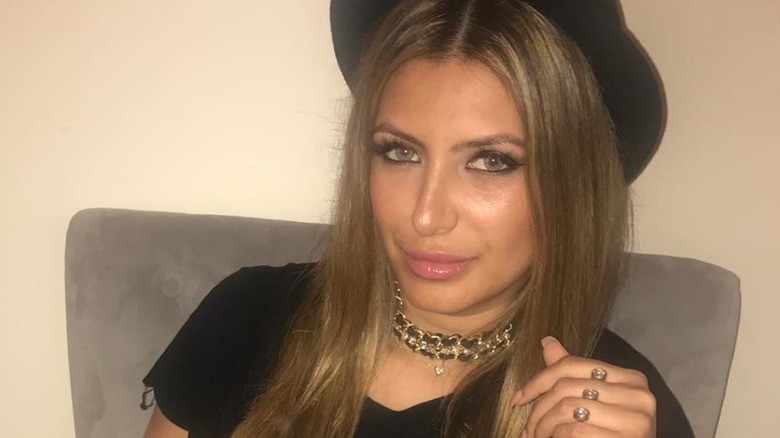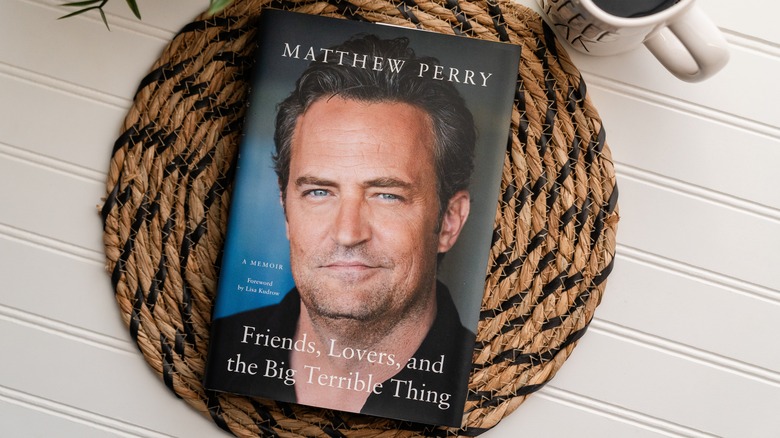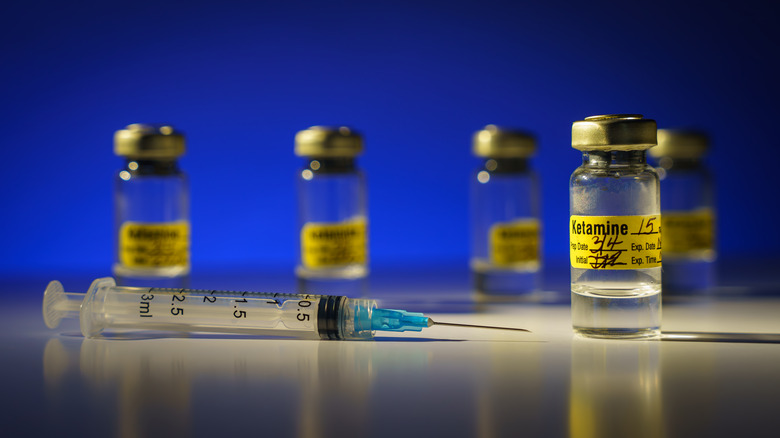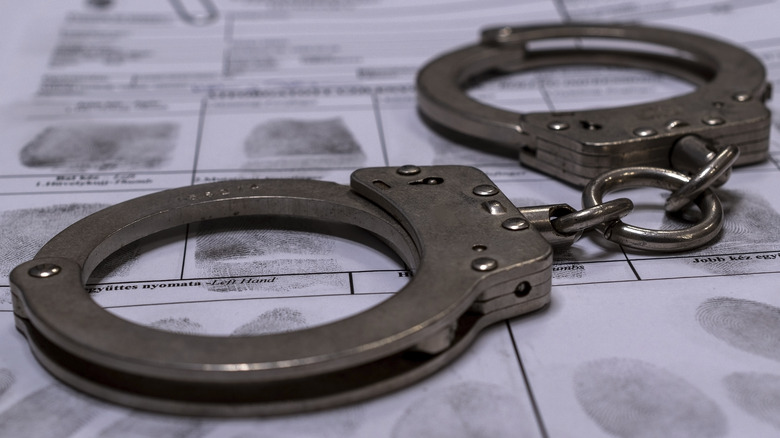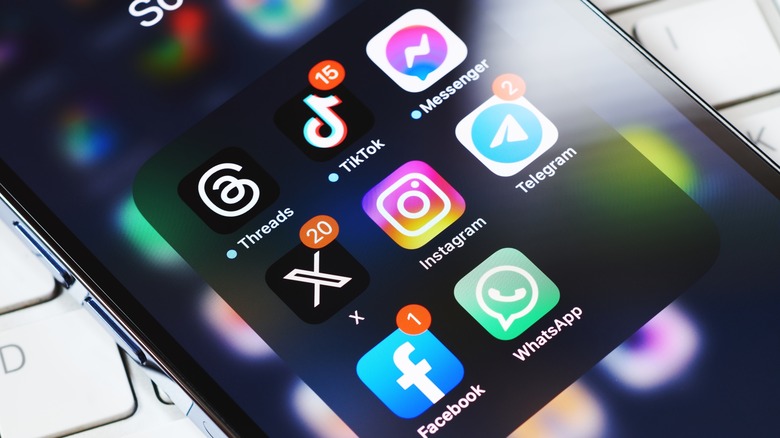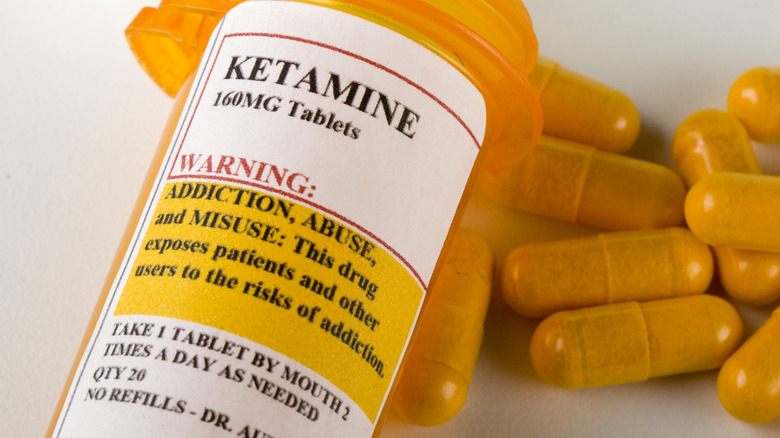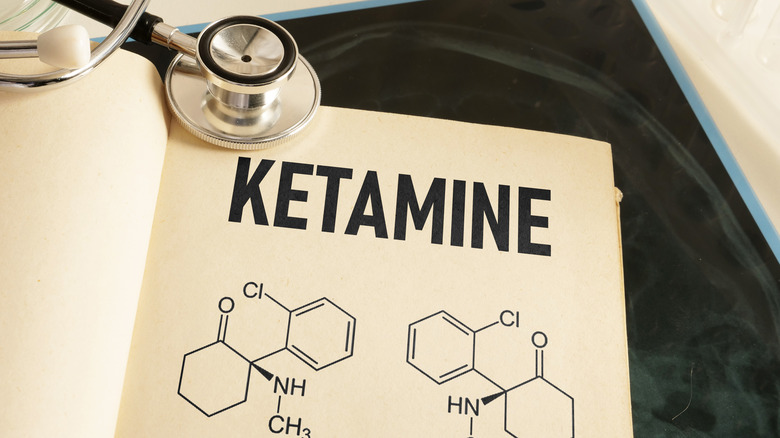Chilling Details About The Ketamine Queen
Although it might seem like headlines are reporting on celebrity deaths at least a few times a week, there are some that are more shocking and less expected than others. When Matthew Perry's death was reported in 2023, it was one of those that seemed to come out of nowhere, especially considering the 54-year-old star's widely beloved role on "Friends." Matthew Perry's character, Chandler Bing, was so iconic that he even changed everyday speech patterns for the generation who grew up tuning in every week.
Perry died on October 28, and speculation was widespread, even though it was immediately reported that there was no foul play suspected. On December 15, the release of Perry's autopsy report revealed tragic details and identified his cause of death as "acute effects of ketamine," and a massive investigation into his death was launched.
One of the names that was very quickly associated with the investigation and the sale of ketamine — along with other controlled substances — was Jasveen Sangha. Authorities dubbed her the "Ketamine Queen," and in 2024, she was arrested along with several others amid accusations that she had supplied Perry with the drugs that led to his death. As more information about Sangha was released, authorities began to paint a chilling picture of a sprawling underground network of drug suppliers. Sangha was accused of flaunting a lavish lifestyle funded by her connections to the drug trade, and authorities began to piece together not only the circumstances that led to Perry's death, but also her alleged involvement.
This article contains descriptions and allegations of drug misuse and addiction.
If you or anyone you know needs help with addiction issues, help is available. Visit the Substance Abuse and Mental Health Services Administration website or contact SAMHSA's National Helpline at 1-800-662-HELP (4357).
Jasveen Sangha is one of five people charged in connection with the death of Matthew Perry
On August 15, 2024, the U.S. Attorney's Office for the Central District of California issued a press release. It detailed information contained in newly unsealed court documents pertaining to the arrests that had been made in connection with Matthew Perry's death, as well as the charges that had been filed. The first name mentioned in the release was Jasveen Sangha, who authorities had identified by the nickname of "The Ketamine Queen."
Also charged for ketamine distribution were Dr. Salvador Plasencia, and — in a separate set of charges — Erik Fleming, who pleaded guilty to a charge relating to buying ketamine from Sangha and giving it to Perry's assistant; Kenneth Iwamasa, Perry's assistant, who pleaded guilty to injecting the actor with the drug over the course of a series of incidents, and Dr. Mark Chave, who pleaded guilty to giving ketamine to Plasencia with a fraudulent prescription.
According to the allegations outlined in the release, Plasencia reportedly contacted Chavez to arrange a source for supplying Perry with ketamine, which would be administered via his assistant. Court documents also allege that by mid-October 2023, Fleming was helping Iwamasa coordinate ketamine purchases from Sangha, and when Perry died shortly after, "Sangha texted Fleming, 'Delete all our messages.'" Fleming was reported (via The New York Times) to have told Sangha that he had only been in contact with Iwamasa, not Perry, and "that he was '90% sure everyone is protected.'"
The indictment accuses Sangha of conspiring with others to target Perry
Many of the most tragic details of Matthew Perry's life were made public by the actor himself in his memoir, released in November of 2022. In it, Perry candidly discussed addiction, among other things, and according to the unsealed court documents detailing the arrests, Dr. Salvador Plasencia had continued to supply Perry's assistant with syringes and ketamine "despite being informed at least one week earlier that Perry's ketamine addiction was spiraling out of control."
The official indictment against the five people charged in Perry's death (via CBS News) details the language that Jasveen Sangha reportedly used in describing ketamine, which included "Dr. Pepper," "cans," and "bots." It also suggested that the five specifically targeted Perry, with one September 2023 text exchange between Plasencia and Dr. Mark Chavez reading: "I wonder how much this moron will pay," and "Lets find out." Another text from Plasencia reportedly read: "[i]f today goes well we may have repeat business."
The document further says that on October 12, 2023, Perry was injected with a massive dose of ketamine, which caused a blood pressure spike recognized as being dangerous by those involved. That was reportedly two days after Erik Fleming and Jasveen Sangha spoke (via the Signal app) about arranging for the sale of ketamine, and the day after Sangha offered a sample and the explanation: "It's unmarked but it's amazing — he take one and try it and I have more if he likes."
Sangha reportedly boasted about offering only high-quality drugs
In an official indictment, authorities write that Erik Fleming reached out to Jasveen Sangha to obtain ketamine for Matthew Perry around two weeks before his death. Fleming was reported to have inquired about quantity, quality, and availability, and Sangha was recorded as having responded with a guarantee that she only sold the highest-quality ketamine. The following day, Fleming sent a screenshot of their conversation to Perry's assistant, Kenneth Iwamasa.
Along with that was the message, "[j]ust got this from my person. She only deal[s] with high end celebs. If it were not great stuff she'd lose her business."
By October 13, Fleming was recorded as having promised that Sangha "said she can fill any order," and the initial order was reportedly for 25 vials of ketamine. Court documents say it was filed by Sangha at the so-called "Sangha Stash House," and another nearly identical, 25-vial, $6,000 purchase was initiated on October 23. At the time, Fleming claimed that Sangha referred to her supplier as "the 'master chef" and "scientist," and in something of an eerie addition, Sangha reportedly added a bonus to the order because it was so large: ketamine lollipops. Two days later, Sangha was said to have sent another message: "Please let me know if u think There will be another round ... I'll have to know ahead of time ..."
A raid on her home resulted in the seizure of a number of other controlled substances
In an article by The New York Times covering the last days of Matthew Perry's life, it was reported that he had gone through proper channels in an attempt to undergo ketamine therapy under the guidance of certified medical professionals. However, it was noted that when they refused to raise his dosage, he began looking into acquiring it in other ways. His assistant stated that he went through Dr. Salvador Plasencia first, but when they determined that they needed an even larger supply, they turned to Erik Fleming and Jasveen Sangha.
Federal prosecutors reported (via NBC News) that Sangha had been connected to the drug trade for several years. When Sangha was arrested and charged, some of the charges, including "maintaining a drug-involved premises" and "possession with intent to distribute methamphetamine," were in relation to other drug-related discoveries.
It was also revealed that after Perry died and the investigation pointed federal agents in the direction of Sangha, her North Hollywood home was raided. During the raid, officers recovered 79 vials of ketamine and around 3 pounds of other drugs, including methamphetamine, hallucinogenic mushrooms, and cocaine. (For an in-depth look at just what crack cocaine does to your body, click here.)
Sangha was also connected to a 2019 ketamine-related death
According to the U.S. Attorney's Office press release and the indictment against Jasveen Sangha, she "was aware of the danger of ketamine," particularly when used in a setting that wasn't overseen by medical professionals. Authorities claimed that she had been selling drugs — including ketamine — since at least 2019, which was the same year that she was connected to the overdose death of Cody McLaury.
Prosecutors in Perry's case revealed (via NBC News) a text that one of McLaury's family members sent Sangha after his death. It read: "The ketamine you sold my brother killed him. It's listed as the cause of death."
They went on to accuse Sangha of continuing to sell ketamine, even though she knew the dangers. Among the pieces of evidence they brought to the table was a Google search that she had reportedly made after getting the text message. Documents say that she had searched, "Can ketamine be listed as a cause of death," which was also included in the indictment against her.
(Is there a difference between a cause of death and a manner of death? Yes: for an in-depth explanation of just how these terms work, click here. If you're still interested in learning more about the process of determining a cause of death, click here to learn about what actually goes on during an autopsy.)
She was previously arrested on charges of intent to distribute meth
When Jasveen Sangha was arrested in connection with Matthew Perry's death, it was very quickly reported that the charges included the sale of 50 vials of ketamine to him over the course of just two weeks. (Although Matthew Perry's death has been the most widely publicized tragedy to hit the cast of "Friends" in recent years, it's not the only one: Click here to read more about some of the hardships that the cast has faced.) Quickly, various media outlets reported that it was also likely further charges would be filed regarding the death of Cody McLaury.
Although details were scarce, it was also revealed that she had one previous arrest on her record. She had been arrested in the same district in the same year, and had been freed on bail after being charged with possession with intent to distribute methamphetamine. Again, details on that federal case are scarce.
Friends and neighbors have spoken of massive parties and no indication of involvement in the drug trade
Did Jasveen Sangha's neighbors suspect that there was anything illegal going on in her life? The press release issued around the arrest of Jasveen Sangha specified that she was accused of using her North Hollywood home as a stash house to deal drugs for at least five years by the time she was arrested. Neighbors, however, said that while they noticed some strange activity at her house, there was nothing that led them to suspect they were living next to a stash house.
In one interview (via Sky News), neighbor Jamie Duke said that he had thought the house belonged to musicians because he often saw people coming and going while carrying instrument cases. There were a few altercations and at least one break-in, he said, but continued. "It's pretty bizarre. I never really thought that would be something I would be next door to, it's kind of surreal and scary."
Sangha's friends have also spoken on her behalf, with one telling the Daily Mail that she was "uplifting ... bubbly and sweet." Others voiced their concern for her, while another said, "She's a friend of mine. I mean, at the end of the day, nobody's forcing anybody to do drugs."
She documented her lavish lifestyle on social media
When Jasveen Sangha appeared in court, prosecutors pointed to her social media as evidence of her connection to the drug trade. One of the photos (via the Daily Mail) was of a bracelet that read "Mushy" and included a few mushroom charms, as well as an added text label that read, "Pulling out the old raver candy #ravetothegrave." Prosecutors explained that "[it] suggest[ed] that she cannot be stopped and will persist in her drug lifestyle until death — a callous choice of words, considering that her actions have sent two victims to theirs."
Other media outlets reported on her social media posts: She was pictured vacationing in places like Mexico and Tokyo, eating caviar in airports, posing on beachfront properties, wearing designer clothing, and practicing what she called "sound healing," which included things like post-partying IV drips and cleanses.
Friends also said that not only did they have no idea that she would be arrested for alleged connections to the drug trade, but that when she hosted an extravagant birthday party just before her arrest, she gave no indication that there were any problems in her life. An acquaintance named Greg Wasik told the Daily Mail, "I was at her birthday party just the other day and there was no inkling of anything like this going on in her life. She was definitely just a pretty normal person I've known for years."
Some therapists have suggested ketamine will be unfairly demonized
Ketamine, it turns out, might be something of a double-edged sword. Although many are quick to point out that more research needs to be done, some mental health professionals are adamant that ketamine has the potential to change lives for the better, but only when it's administered properly. It's been shown to be successful in treating conditions like depression, chronic pain, cancer pain, migraines, anxiety, and post-traumatic stress disorder.
However, there's an increasing concern over the likelihood that it can be improperly used, abused, and even tainted, particularly with fentanyl. Yale School of Medicine psychiatry professor Dr Gerard Sanacora told CNN, "Ketamine is possibly the major advance in the area of psychiatry in the past fifty years, but it's not without risk. It's always been a balance. The reality is that it is an amazing treatment for many people, but we also know that it is a drug that people misuse and will abuse."
Prosecutors described Jasveen Sangha and the others charged in the ketamine-related death of Matthew Perry (via NBC News) as being "more interested in profiting off of Mr. Perry than caring for his well-being," and professionals worry that will end up being a huge setback for the regulated use of ketamine. In an interview with the Los Angeles Times, psychotherapist Carol Gilson explained that she had led thousands of successful sessions using ketamine: "Ketamine is a valuable medicine. And my biggest fear is that it is in danger, because of people like this."
Convictions in Matthew Perry's death might be the tip of the iceberg
Shortly after details concerning the charges brought against Jasveen Sangha went public, former federal prosecutor Neama Rahmani told Page Six that it might be only the beginning of the story. "She may name anyone connected to her, anyone who supplied to her or she supplied to. Hollywood celebrities should be quaking in their boots ... anyone who has anything to do with Jasveen Sangha should be really concerned right now."
Authorities have been investigating the rising popularity of ketamine since before Perry's death. The one-time dance club drug of choice skyrocketed in popularity during the early 2020s, and according to NYU Langone associate professor Joseph Palamar, the drug has gotten a major boost from the drug's appearance in various media, along with a connection to the rich and famous. Celebrities from Pete Davidson to Elon Musk have been open about their ketamine use, and Palamar told The Washington Post, "I don't think it's coincidental that all those things are increasing at the same time. When things start becoming popular, the thought of ketamine is introduced to people who never would have used the drug."
Due in large part to some COVID-19-era changes in the way some medications are prescribed and the black-market demand for ketamine, medical experts are warning that illicit operations could lead to an uptick in ketamine-related deaths — especially considering that the amount of illegal ketamine seized increased by a factor of about 12 between 2017 and 2022 alone.
